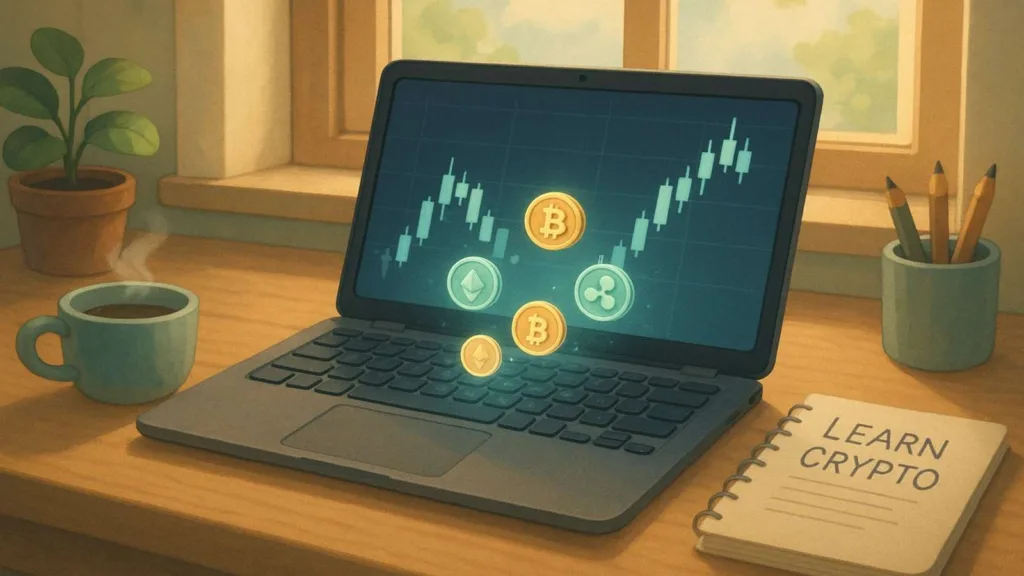Ready to finally understand what all the crypto buzz is about? It’s not as complicated as it seems, and the best way to start is with a clear guide. This is the perfect place to learn crypto from scratch.
We’ll help you go from a curious beginner to a confident trader, one simple step at a time. And the fact that you’re here reading this means you’re already ahead of most beginners. Let’s break it down simply and practically!
Step 1: Understand what trading really is
Trading involves buying and selling financial assets such as cryptocurrencies, stocks, foreign exchange, or commodities to profit from price fluctuations. But before you dive into learning crypto, you must accept two truths:
- You can lose money just as fast as you make it.
- The goal isn’t to trade often; it’s to trade wisely.
So your first goal should be education, not profit. Trading rewards patience, not speed.
Step 2: Learn the basics before touching real money
Before putting real money into the market, take time to learn crypto basics and trading principles. You need to understand:
- How markets work (supply, demand, and price movements)
- How to read charts (candlesticks, trends, and key levels)
- Different trading styles (day trading, swing trading, or long-term investing)
- Risk management (stop-loss, capital control, and diversification)

Step 3: Choose your market
Once you have basic knowledge, decide which market excites you most.
- Crypto: Binance, OKX, Coinbase
- Stocks: eToro, Interactive Brokers, TD Ameritrade
- Forex: Exness, IC Markets, OANDA
Each market moves differently and has its own risks. If your goal is to learn crypto, start there; one market at a time. Don’t rush into it all at once.
Step 4: Open a demo account
Every trusted broker or exchange offers a demo account, where you can trade with fake funds in real-time market conditions. This is your safe zone to:
- Practice without losing money
- Understand how trading platforms work
- Test your strategies and improve decision-making
Stay on demo for at least one to two months before using real money. It’s the best way to learn crypto trading without risk.
Step 5: Build a trading plan
A strong trading plan is your personal rulebook. It defines:
- Entry and exit rules
- Risk per trade (usually 1–2% of your capital)
- Preferred timeframes
- Profit targets and stop-loss levels
Write it down and stick to it. Emotional trading destroys accounts faster than bad analysis.
Step 6: Learn risk and psychology early
Trading is 80% mindset. Learn to manage greed, fear, and overconfidence. Remember this golden rule:
“Trade like a robot, think like a student.”
Books that can help you build a healthy mindset:
- “Trading in the Zone” by Mark Douglas
- “The Psychology of Money” by Morgan Housel
If you want to learn crypto for the long term, focus on emotional control as much as technical skill.
Step 7: Start small
When you finally move to a live account, start small.
- Trade with money you can afford to lose.
- Begin with $50–$200, not thousands.
- Focus on learning and consistency over fast profits.
Even a small, steady gain of 1% daily or learning one new skill per week adds up over time.

Optional step: Learn crypto technical tools
Once you’re comfortable trading, you can explore helpful tools to sharpen your edge:
- TradingView: a free charting platform for all markets
- Indicators: RSI, MACD, and Moving Averages (to understand momentum and trends)
- Market News: follow updates on AltcoinDesk.com, CoinHeadlines, TimesCrypto, CoinMedium, Cointelegraph, Bloomberg, The Bit Gazette, etc.
These tools help you make informed decisions as you learn crypto and follow market movements.
Step 8: Keep a trading journal
After every trade, take notes:
- Why you entered
- What happened
- What you learned
This habit turns experience into mastery. Over time, your journal becomes your best teacher. It shows your strengths, weaknesses, and progress more clearly than any signal group or course.
Final thoughts
If you want to learn crypto trading, start slow, stay curious, and build your skills one step at a time. Trading is not a race; it’s a craft. The key is discipline, patience, and practice.
So before you chase profits, chase knowledge. Because in trading, the best investment you’ll ever make is in your own education.





